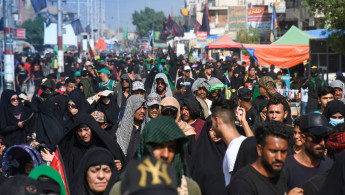Arbaeen marks the end of the 40-day mourning period for the seventh century killing of Imam Hussein, Prophet Mohammed's grandson, by followers of Caliph Yazid, and falls on Thursday.
His killing, a seminal moment in Islam's Sunni-Shia schism, was mourned this year at the end of August during Ashura ceremonies in Shia-majority Iraq and other countries with Shia communities.
But unlike previous years, Iraq had closed its borders to non-residents, allowing only residents to take part in Ashura.
Iraq's borders opened for Arbaeen but with restrictions on Arbaeen arrivals, in a bid to stem the spread of coronavirus.
The virus has hit Iraq hard, with more than 375,000 people infected and almost 9,500 deaths.
Read also: Masks and tears: Shia muslims mark Ashura in Iraq's Karbala despite coronavirus
In 2019, an estimated 14 million Shia pilgrims flooded Iraq to attend Arbaeen, including about two million from neighbouring Iran.
This year, however, only 1,500 pilgrims per country are being allowed to fly into Iraq, while Iran has been authorised to send an additional 2,500 overland.
"Every day, between six and 10 planes land and more are coming in the days ahead," said Issa al-Shemmari, airport director in Najaf, another holy city south of Karbala.
In keeping with tradition, Iraqis have been walking to Karbala for Arbaeen from all over the country.
On roads to the city, "mawakib" tents have been erected to provide pilgrims with free food, drink and accommodation.
"We ate along the way and were able to disinfect ourselves," pilgrim Ali Hadi told AFP, on arrival in Karbala from the southern city of Basra.
Only few of the pilgrims around him wore mouth and nose coverings despite constant appeals from authorities and social distancing was being widely ignored.
In neighbouring Saudi Arabia on Sunday, mask-clad Muslims circled Islam's holiest site in Mecca along socially distanced paths, as authorities partially resumed the year-round umrah pilgrimage with extensive health precautions.
Follow us on Facebook, Twitter and Instagram to stay connected





 Follow the Middle East's top stories in English at The New Arab on Google News
Follow the Middle East's top stories in English at The New Arab on Google News
![The UAE is widely suspected of arming the RSF militia [Getty]](/sites/default/files/styles/image_330x185/public/2024-11/GettyImages-472529908.jpg?h=69f2b9d0&itok=Yauw3YTG)
![Netanyahu furiously denounced the ICC [Getty]](/sites/default/files/styles/image_330x185/public/2024-11/GettyImages-2169352575.jpg?h=199d8c1f&itok=-vRiruf5)
![Both Hamas and the Palestinian Authority welcomed the ICC arrest warrants [Getty]](/sites/default/files/styles/image_330x185/public/2024-11/GettyImages-2178351173.jpg?h=199d8c1f&itok=TV858iVg)